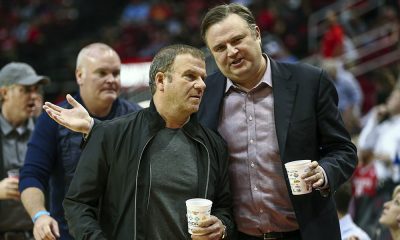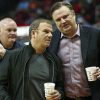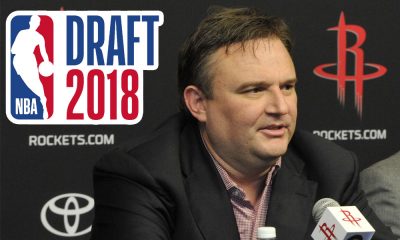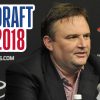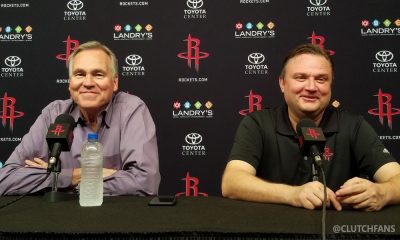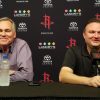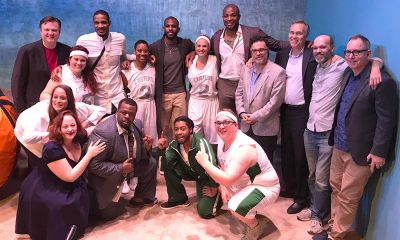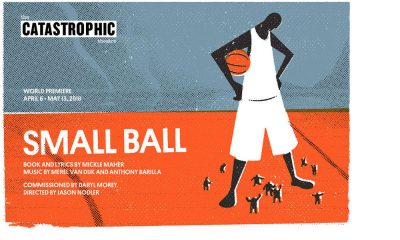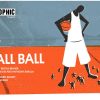Houston Rockets
The Chandler Parsons Contract: Salary Cap Implications of Exercising or Declining the Team Option
There is no obvious choice for the Rockets on whether to exercise or decline the team option on Chandler Parsons, but David Weiner takes a look at the salary impact of both routes.
Published
12 years agoon
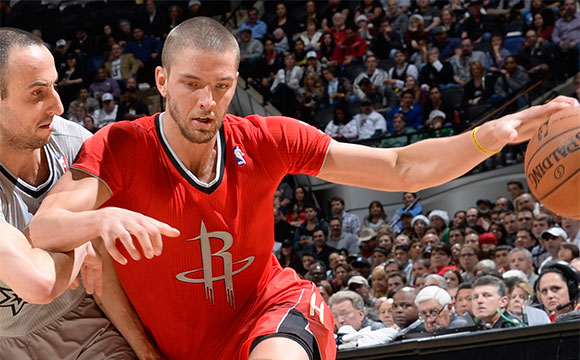
The decision on whether to exercise their team option on Chandler Parsons’s contract is among the Rockets’ biggest quandaries heading into the summer of 2014
***UPDATED June 7, 2014***
Due to additional information obtained and confirmed, as well as a more careful reading of the 2011 NBA Collective Bargaining Agreement, this piece has been updated to more accurately describe the cap hit for Chandler Parsons if the team option on his contract is declined.
This article is intended solely as an analysis of the salary cap effects of certain decisions that the Rockets make with respect to Parsons’s contract and is not intended to express an opinion on such decisions.
The Partial “Guarantee” And The Team Option That Nullifies It
On January 1, 2014, by not having been waived before such date, a portion of Parsons’s 2014-15 salary ($624,771, to be exact) became guaranteed. If Parsons is not waived by June 30, his entire 2014-15 salary ($964,750) becomes guaranteed.
However, these “guarantees” are illusory.
Parsons’s contract includes a team option for the 2014-15 season. Because it is a team option, the Rockets essentially get to decide whether that season of his contract exists or not. By declining the option, Houston has the power to nullify those guarantees, which would only exist if the option were exercised.
In the end, the partial guarantee earned on January 1 is largely pointless. (Hypothetically, the Rockets could exercise the team option on June 28 and then immediately change their mind about Parsons and waive him, in which case Parsons would be $624,771 richer for having had that partial guarantee . . . but that is a fairly ridiculous set of circumstances.)
With that little nugget of information now known, let’s take a closer look at the salary cap implications of the Rockets either exercising or declining that team option.
Exercising The Option
If the Rockets elect to exercise their team option on Parsons’s contract, then Parsons will earn — and will count against the salary cap in the amount of — only $964,750. That is only slightly greater than the minimum salary for a three-year veteran.
Because of Parsons’s miniscule 2014-15 salary, his cap hold on the Rockets’ books when he hits free agency in 2015 until he is signed (either by the Rockets or another team) will be a paltry $1,833,025. This figure is equal to 190% of Parsons’s 2014-15 salary, which is the method used to determine cap holds for players (other than those coming off rookie scale contracts, which Parsons is not) making below the average player salary and for whom a team holds full Bird rights.
By having such a small cap hold for Parsons, the Rockets would be able to use all of their available cap room in 2015 — except for that $1,833,025 cap hold amount — to pursue outside free agents (in a free agent class that is expected to include Kevin Love and LaMarcus Aldridge), then later exceed the salary cap to re-sign Parsons to any amount using his Bird rights.
Declining The Option
If the Rockets elect not to exercise their team option on Parsons’s contract, and if the Rockets extend a qualifying offer to Parsons (more on that below), then Parsons would become a restricted free agent.
By making Parsons a restricted free agent, the Rockets would have the right to match any offer he receives from another team. Typically, restricted free agents whose teams are clearly interested in re-signing them do not receive the level of interest that a similarly-situated unrestricted free agent does, thereby “chilling the bidding” on the player and potentially allowing his original team to re-sign him at a relatively lower salary. (A recent example of this is Nikola Pekovic, who had to wait around for most of last summer without an offer sheet before eventually re-signing with the Timberwolves.)
Because Parsons would have been under the same contract with the Rockets for three seasons (2011-2014), the Rockets would have full Bird rights on Parsons and could exceed the salary cap to re-sign him to a five-year deal at any amount up to the maximum salary (expected to be a starting salary in the $14 million range for players with 0-6 years of service).
(NOTE: Parsons is not subject to the “Gilbert Arenas Rule” that governed the structure of the contracts that the Rockets handed out to Omer Asik and Jeremy Lin. The Arenas Rule is limited solely to one- and two-year veterans. There is no “poison pill” that another team could work into an offer sheet for Parsons.)
If Parsons becomes a restricted free agent, then his cap hold next summer will be the greatest of (a) his “ordinary” cap hold of 190% of his 2013-14 salary (or $1,760,350), (b) the first year salary in any offer sheet he signs that the Rockets wish to match, or (c) his qualifying offer.
A qualifying offer is the minimum amount that a team must offer to a player (as a one-year deal) by June 30 each year in order to make him a restricted free agent. Without a qualifying offer, the player automatically becomes an unrestricted free agent. Under the prior CBA, this would have been a similarly low amount to his “ordinary” cap hold. However, the new CBA changed the rules regarding qualifying offers to young players who significantly outplay their draft status.
Under the new CBA, if a young player taken outside the first half of the lottery meets certain “starter criteria” in either the year prior to his free agency or averaged over the two years prior to his free agency, then he is entitled to a higher qualifying offer. In the case of second round picks meeting the starter criteria, they are entitled to a qualifying offer equal to 100% of the rookie scale qualifying offer for the 21st selection of the draft class whose rookie scale contracts are up for qualifying offers this summer.
As applied to Parsons this summer, he is entitled to whatever qualifying offer the 21st pick in the 2010 NBA Draft would have gotten if signed to 100% of the rookie scale. (FYI, the 21st pick in 2010 was Craig Brackins, but that is irrelevant here.) That amount is $2,875,130.
(For more information about restricted free agency, qualifying offers and the starter criteria, read this portion of Larry Coon’s NBA Salary Cap FAQ.)
On the other hand, if Parsons is not extended a qualifying offer and is allowed to become an unrestricted free agent in 2014, he would count against the Rockets’ cap in the amount of his “ordinary” cap hold ($1,760,350). However, since the chief purpose of declining Parsons’s option is to make him a restricted free agent, it is unlikely this would happen.
So, for all intents and purposes, the cap hit for Parsons if his option is declined will be $2,875,130 . . . until he signs an offer sheet or a new contract.
While the Rockets do not expect to have much (if any) salary cap room in the summer of 2014 assuming that no further roster moves are made, it is entirely possible that subsequent roster moves (such as those involving Asik and/or Lin being traded for less salary or expiring contracts) could create a situation in which 2014 cap room becomes a legitimate priority for the Rockets. In such an event, the amount that Parsons counts against the cap could become a material concern.
Conclusion
The Houston Rockets face a major decision on whether to exercise their team option on Parsons. Of course, there are various other factors in play here besides just the salary cap mechanics associated with each decision. Such factors include the team’s need for salary cap room in light of subsequent roster moves (such as an Asik trade), the availability of outside free agents, any additional leverage held by NBA super-agent Dan Fegan (hired by Parsons this past summer), and, perhaps most importantly, the “human element” of dealing with Chandler Parsons on a personal level.
When all factors are included, there is no easy choice for the Rockets. But it is a choice that will be closely followed by Rockets fans.
Analysis
Podcast: As trade season begins, will the Rockets make a splash?
Published
6 days agoon
December 16, 2025By
Ben DuBose
In this roundtable conversation, ClutchFans Editor Dave Hardisty joins Ben DuBose and Paulo Alves to preview the NBA’s upcoming transaction window and its potential implications for the 16-7 Houston Rockets.
December 15 is when players who signed contracts in the preceding offseason become trade eligible, so the period from Monday until the in-season deadline of February 5, 2026, is likely to be among the most active on the 2025-26 calendar.
Discussion topics include roster needs and potential trade targets across the board, including the likelihood of bigger-name deals (such as Giannis Antetokounmpo, Jrue Holiday, and James Harden) and smaller acquisitions along the lines of Keon Ellis, Chris Paul, and Ayo Dosunmu.
The show also explores Houston’s potential desirability on the buyout market and the team’s long-term timeline for title contention, and specifically why those factors might make this a relatively quiet trade window for the Rockets.
Editor’s note: Hardisty and DuBose also host regular “ClutchFans Live” postgame recap shows on YouTube, while DuBose and Alves are co-hosts of the Rockets LaunchPod podcast, presented by ClutchFans and with support from SportsTalk 790 — official flagship radio station of the Rockets. Tune in to both shows for more coverage!
Analysis
NBA front-offices poll: Rafael Stone’s Rockets rise to No. 3
Published
2 weeks agoon
December 10, 2025By
Ben DuBose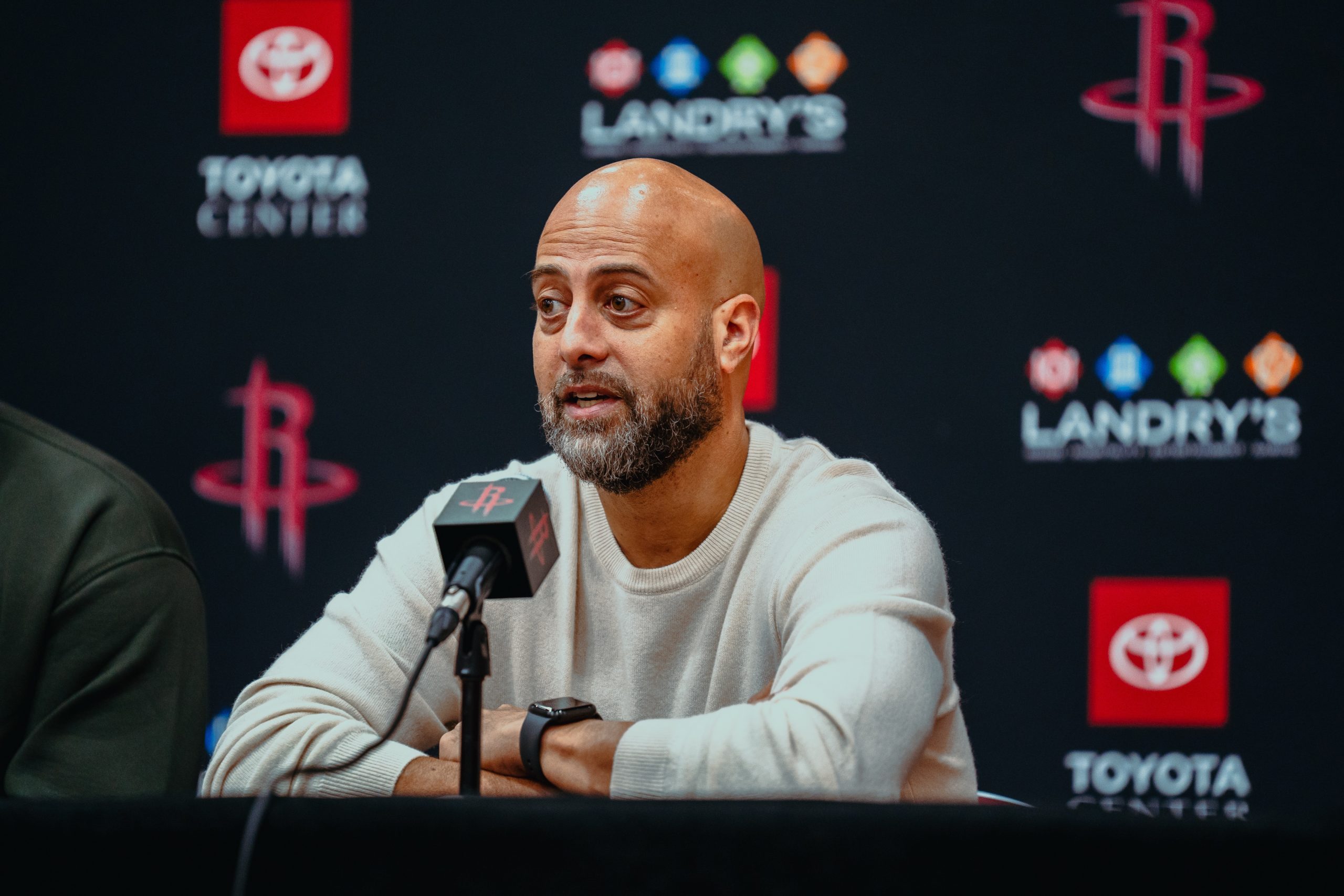
At 15-6, the Rockets are currently tied for the second-fewest losses in the Western Conference standings, and they own the NBA’s No. 2 net rating.
And yet, just two years ago, Houston was coming off three straight rebuilding seasons with the worst record in the West.
It’s been a remarkable rise under the guidance of general manager Rafael Stone, who has combined the development of young players such as Alperen Sengun, Amen Thompson, Jabari Smith Jr., and Reed Sheppard with the acquisition of impact veterans — namely, Kevin Durant, Steven Adams, and the injured Fred VanVleet.
Making matters even better, the Rockets added and developed all that talent while still retaining several high-end future draft assets, to boot. Houston believes that draft equity can make it a sustainable contender for years to come, both in terms of having desirable trade assets and an ability to replenish its roster depth in cost-efficient ways.
With the 2025-26 regular season now at approximately its quarter pole, The Athletic recently canvassed 36 executives across the league — presidents, general managers, vice presidents, and assistant GMs — to rank the NBA’s top front offices.
Led by Stone, the Rockets’ front office comes in at No. 3, trailing only the last two champions — the Oklahoma City Thunder and Boston Celtics.
“High-end talent, a willingness to be bold, (and) good asset management,” one executive told The Athletic, when asked to sum up the Rockets.
Time for our annual crowdsourcing to determine the NBA's top front offices – ranked by the NBA's front offices. We found 36 team executives to give us their picks of the best ones right now, and their pick of one FO that is up and coming. In @TheAthletic:https://t.co/9QRrkK8R0b
— David Aldridge (@davidaldridgedc) December 10, 2025
Houston finished with one first-place vote; six second- and third-place votes, apiece; five fourth-place votes; and three fifth-place votes.
“They have drafted well, built a deep team in a tough Western Conference while managing tax aprons,” said one executive who voted the Rockets second. “(They) hired a good coach (Ime Udoka) and built an overall team identity, then added KD for cheap. From where they were only a few years ago, they have done a good job turning it around.”
Per Sam Amick of The Athletic, Stone “values this young core greatly and has frequently resisted the temptation to reach for overpriced roster shortcuts.” Udoka has an “influential voice” with the front office, as well, Amick adds.
Amick notes that the Durant trade came at a relatively low asset cost, adding that the Rockets are uninterested in pursuing a trade with the Memphis Grizzlies for disgruntled star Ja Morant.
The Athletic’s complete front-office rankings can be viewed here. This time a year ago, in the same exercise, Houston finished in a tie for the No. 11 spot.
Analysis
With NBA Cup run complete, Rockets add Clippers, Nuggets to December schedule
Published
3 weeks agoon
November 29, 2025By
Ben DuBose
After their Emirates NBA Cup 2025 elimination, the Rockets (12-4) learned two additional December dates for their 2025-26 regular season.
As announced Saturday by the league office, the Los Angeles Clippers (5-14) will visit Houston on Thursday, Dec. 11. Tipoff at Toyota Center will be at 7:00 p.m. Central.
Meanwhile, the Rockets (12-4) will then head to Denver on Monday, Dec. 15, where tipoff versus the Nuggets (13-5) is at 8:30 p.m. Central.
During Cup games, all three of the Clippers, Nuggets, and Rockets went 2-2 in Western Conference group-stage play. Because only four teams out of the 15 in each conference advance to the knockout rounds, a 2-2 record in group games isn’t usually enough to finish among the top four, and that was again the case this year.
To ensure that all teams play 82 regular-season games, teams who don’t advance then have two additional December games scheduled versus same-conference opponents who also did not advance.
In most cases, these add-on matchups come down to a formula. Taking Houston as an example, each season’s schedule includes two games (one home, one away) versus all East opponents and four games (two home, two away) versus most West opponents.
However, if that was the case for all same-conference opponents, the schedule would be at 86 games in length. So, there is a select group — rotating each year — of same-conference opponents on the docket only three times.
To trim down to 80 games (to account for the possibility of Cup advancement), the six West teams with only three dates on Houston’s initial 2025-26 schedule were the Clippers, Nuggets, Warriors, Oklahoma City Thunder, Minnesota Timberwolves, and Los Angeles Lakers.
Add-on games are typically chosen from that group, and the Thunder and Lakers advanced in Cup play, thus taking them off the table. So, it came down to two teams from the other four.
Led by James Harden, the reeling Clippers have yet to play Houston this season, though they will meet again on Dec. 23 in Los Angeles.
Meanwhile, the Nikola Jokic-led Nuggets enjoyed a close Nov. 21 victory in Houston. For the Rockets, Kevin Durant and Alperen Sengun each struggled in that game.
Now, less than a month later — in a matchup that could prove pivotal in the West standings race — Durant and Sengun (assuming health) will get an opportunity to make amends.
Denver and Houston are currently tied for the No. 3 spot in the West (trailing the Thunder and Lakers), though the Rockets are technically ahead by percentage points due to playing two fewer games. Thus, that Dec. 15 rematch could have significant stakes for both sides.
Analysis
This Thanksgiving, the Rockets are thankful for Reed Sheppard
Published
4 weeks agoon
November 27, 2025By
Ben DuBose
Relative to their expected formula from the 2025 offseason, the Rockets were missing five rotation players in Wednesday’s Thanksgiving Eve playoff rematch versus the Warriors.
Kevin Durant (personal reasons), Steven Adams (right ankle tendinopathy), and Tari Eason (right oblique strain) were all sidelined, and veterans Fred VanVleet (right knee) and Dorian Finney-Smith (left ankle) remain on the shelf after offseason surgeries.
Yet, the Rockets (12-4) still won for a 12th time in 14 games, and they overcame a 14-point road deficit against a high-profile Golden State squad featuring the likes of Steph Curry, Jimmy Butler, and Draymond Green.
The biggest reason was second-year guard Reed Sheppard, who set career-highs in points (31) and rebounds (9) while making 12-of-25 shots (48.0%), including four 3-pointers.
“He was big,” said head coach Ime Udoka, whose Rockets won despite shooting below 40% overall and 30% from 3-point range. “Reed really held us together when guys were struggling.”
For the season, Sheppard — a starter for Udoka over the past two games — is averaging 14.3 points, 3.3 assists, 2.8 rebounds, and 1.6 steals in 24.9 minutes per game. He’s shooting 48.8% overall and 45.5% on 3-pointers, with the latter figure coming in at No. 11 among hundreds of qualified NBA players.
But the advanced metrics are even more impressive. Per Basketball Reference, here’s where Sheppard ranks among his NBA peers in several impact categories:
• Box plus/minus (BPM): No. 5 (7.3)
• Defensive BPM: No. 6 (2.7)
• Offensive BPM: No. 15 (4.6)
• Win shares per 48 minutes: No. 10 (.208)
• Value over replacement player (VORP): No. 16 (0.9)
• True shooting (TS): No. 42 (62.9%)
• Player efficiency rating (PER): No. 40 (19.6)
• Steal percentage: No. 5 (3.3%)
The only players with a superior BPM are a quartet of annual Most Valuable Player (MVP) frontrunners in Nikola Jokic, Shai Gilgeous-Alexander, Giannis Antetokounmpo, and Luka Doncic. At the moment, Sheppard is the league’s highest-rated American player!
To say the least, those are remarkable efficiency metrics for a 21-year-old in his second NBA season. And it’s not as if Sheppard is posting those in low-leverage minutes, as evidenced by the key plays he made in the fourth quarter to help put the Warriors away.
“Defensively is where he’s shown the most improvement, overall,” Udoka said from San Francisco. “I think he’s taking on the challenge. The blow-bys are getting less and less. He’s catching up with the physicality of the game. Teams are going to try to attack him, at times, but like we said last year and during this summer, make them go east and west and stay in front of them. Help will come. He’s doing a great job of that.”
Sixteen games in, it’s no longer a particularly small sample. Rounding, it’s actually 20% of the 82-game regular season!
Assuming relative health, the 2025-26 Rockets had a high floor entering the season due to the All-Star presence of Durant and Alperen Sengun. But whether they could achieve a championship ceiling likely depended on further leaps from young players — most notably, the high-upside ones like Sheppard and Amen Thompson.
With Durant out, Thompson was the headliner in Monday’s road victory in Phoenix, and Sheppard stole the show two nights later at Golden State.
For everyone surrounding the organization, it’s an appropriate time to be thankful. With these leaps being shown from players who are extremely young and still improving, the Rockets appear set up to be a force in the Western Conference for quite some time.
“It’s going to be exciting when we get fully healthy and whole,” Udoka surmised.
Analysis
2025 NBA Cup math, schedule update: Rockets unlikely to advance
Published
4 weeks agoon
November 23, 2025By
Ben DuBose
Entering Thanksgiving week, all 30 teams have at least one of their four group-stage games remaining in Emirates NBA Cup 2025 action. Some have two.
But for the Houston Rockets (10-4 on the 2025-26 regular season, 1-2 in Cup play), elimination appears almost inevitable after Friday’s group-stage loss to the Denver Nuggets.
To explain why, let’s look at the Cup standings entering the week:
After their winning their group in the 2024 NBA Cup, the Rockets have already lost the possibility of doing so in 2025. Even if the Rockets win their group-stage finale at Golden State on Wednesday night, Houston’s best-case outcome is a 2-2 mark.
The only way 2-2 would be tied for the Group C lead is if Portland loses at home to San Antonio on Wednesday, followed by the Spurs winning at Denver two nights later. Without that combination of results, at least one of the Trail Blazers and Nuggets would have three group-stage wins, which inherently eliminates Houston.
But even if that unlikely 2-2 scenario somehow played out, the Rockets would be 1-2 against the other three teams in that 2-2 tie. The Spurs and Nuggets would each be 2-1, thus eliminating Houston as a potential group winner.
So, Group C is off the table.
Mathematically, the Rockets do remain alive for the wild-card slot, which goes to the top second-place finisher in each conference. For example, if this week’s games go according to the Vegas odds, it’s quite possible that the Spurs could defeat Portland but lose to Denver, creating a three-way tie between the Rockets, Trail Blazers, and Spurs at 2-2. Since each team would be 1-1 against the other two, head-to-head, it would come down to point differential — and Houston is well ahead of Portland (-18) and currently tied with San Antonio (+10) there.
Should Houston win that tiebreaker, the Rockets would finish second in in Group C. But looking at the remainder of the West, it’s unlikely for that to be enough to earn the wild card.
For starters, if any second-place team in Group A or Group B gets to three wins, the Rockets are automatically eliminated. Last season, both wild-card teams went 3-1 in group play.
But even if 2-2 somehow becomes enough for a tie, the point differential of the Minnesota Timberwolves (2-1, +53) and Oklahoma City Thunder (2-0, +63) will be difficult to overcome. At the moment, those teams — who play each other on Wednesday — are 43 and 53 points ahead of the Rockets, respectively.
So, in order for Houston’s 2-2 mark to somehow be enough to advance, the Rockets would need to make up at least 43 combined points between the final margin of their road game against the Warriors and the remaining group games for the Timberwolves and Thunder.
To say the least, that’s a tall order.
As a result, while not mathematically eliminated just yet, the odds are overwhelmingly against the Rockets advancing to the eight-team knockout phase.
There could, however, be some consolation. Should the Rockets improbably advance to the knockout rounds as a wild card, they would play on the road in the quarterfinal round. From there, should they win, their next game would be in Las Vegas for a neutral-site semifinal.
On the other hand, if the Rockets are eliminated, they would have two games added to their schedule versus West rivals who they are currently slated to play only three times (and not the usual four for most same-conference teams). These add-on games, which would be played during the week of Dec. 9-16, allow all teams to finish at 82 regular-season games in the final 2025-26 standings — i.e. the same as those who gain additional games from advancing to the knockout rounds. The Cup title game does not count toward regular-season standings.
For the Rockets, in contrast to the wild-card scenario, it’s worth noting that one of those two add-on games would be at home, inside Toyota Center.
The possible opponent pool consists of the Thunder, Warriors, Nuggets, Timberwolves, Los Angeles Lakers, and Los Angeles Clippers — and since these would be non-Cup matchups, it would have to be opponents who were also eliminated in group-stage play.
Breaking down that group of six, the home matchup would likely come against a team that is currently on the books for only one appearance in Houston this season. Based on the current schedule, that’s the Warriors, Nuggets, and Thunder.
Conversely, the other three teams — the Lakers, Clippers, and Timberwolves — are only scheduled to get one visit from Houston this season. So, those would likely be the three in the mix for Houston’s add-on road game.
Since the Warriors are almost certain to be eliminated after the Cup’s group stage — and the Nuggets and Thunder are likely to advance to the knockout rounds — the odds would suggest that Golden State becomes Houston’s additional home game in December.
For the add-on road game, the Timberwolves and the loser of Tuesday’s Lakers-Clippers Cup showdown — both Los Angeles teams are 2-0 in Group B, at the moment — would seem to be the strongest candidates.
So, relative to advancing in Cup play, being eliminated would give the Rockets one additional home game. Furthermore, if the add-on games become the Warriors and Clippers, both of those teams are currently at .500 or below this season. As a result, it’s probably to Houston’s scheduling interest for the Clippers to lose on Tuesday night, though it could be argued that the looming return of Kawhi Leonard makes them more of a threat.
Conversely, should Houston somehow advance, any knockout-round opponent would likely be a stronger team. After all, there’s probably a good reason why that team advanced.
It’s a small silver lining, but it’s not nothing. By not advancing in Cup play, the Rockets are likely to get one more home game at Toyota Center — and it’s likely to be a fun one versus Steph Curry, Draymond Green, and the hated Warriors.
For the Rockets and other teams across the league, those Dec. 9-16 matchups, dates, and times will be announced after the Nov. 28 conclusion of all group-stage games (schedule).


